
 |
| Torâh | Haphtârâh | Âmar Ribi Yᵊhoshua | Mᵊnorat ha-Maor |
|---|---|---|---|
To minimize the enormous bandwidth consumed by video data (disk space, dictating loading time), as much content as possible is diverted to the text section (below), with the video handling only the parts that cannot be handled as well by text alone. For this reason, videos are archived in YouTube. Ta•na"khꞋ selections are read from the SeiphꞋër Tor•âhꞋ ha-Tei•mân•iꞋ, the ëÆÌúÆø àÂøÈí öåÉáÈà (Aleppo Codex), an Artscroll Ta•na"khꞋ or iQIsa, as appropriate, and pronounced according to No•sakhꞋ Tei•mân•itꞋ.
 |
25.1 – åÀàÅìÌÆä, úÌåÉìÀãÉú éÄöÀçÈ÷ áÌÆï-àÇáÀøÈäÈí;
The Sages have noted that the bulk of the summary of the life of éÄöÀçÈ÷ Âv•iꞋnu is devoted to æÆáÇç with its prescribed ùÑÀçÄéèÈä.
 |
| Site of the A•qeid•âhꞋ: Har ha-BaꞋyit (Har Moriyah), photographed from nakhal Qidron. Photograph © 1983 by Yirmᵊyahu Bën-Dawid. |
The òÂ÷ÄéãÈä of
éÄöÀçÈ÷ Âv•iꞋnu is one of the most compelling prefigures of the Mâ•
In Ta•na"khꞋ, æÆáÇç most frequently refers to the ùÑÀìÈîÄéí sacrifices. The ùÑÀìÈîÄéí sacrifice marked the completion of the process of
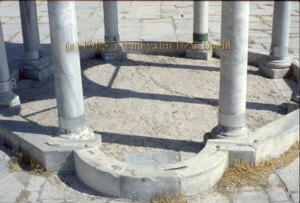 |
| Islamic "Dome of the Spirits" covers The Foundation Bedrock on Har ha-BaꞋyit. where the A•qeid•âhꞋ likely occurred; also where the •ronꞋ hâ-Eid•utꞋ rested within the QoꞋdësh ha-Qâ•dâsh•imꞋ in the Beit ha- |
Answering their rhetorical question, the editors respond, "The answer lies in the similar nature of ùÑÀçÄéèÈä, and the sort of eating which makes an altar of even the ordinary [legitimately úÌåÉøÈä] table."
"Eating with the intention of preserving one's health in order to serve [
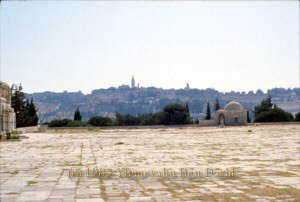 |
| "Har ha-BaꞋyit from Foundation Rock, facing due East—directly over ShaꞋ•ar ha-Rakham•imꞋ to Har ha-Zeit•imꞋ." Talmud instructs that this aligns the front door of the Beit ha- |
"As Mesillat Yesharim writes, the food and drink placed before [an observant Jew or geir; the obvious meaning of the observant Jewish editors who specify "Israelite" below; ybd] become elevated. The food is like an offering, like first fruits, the drink is like the ðÀñÈëÄéí, poured upon the altar. This explains, he continues, the Talmudic dictum that ëÌÉäÂðÄéí àåÉëÀìÄéí åÌáÇòÂìÄéí îÄúÀëÌÇôÌÀøÄéí—that an Israelite enables the [just Kohan•imꞋ] to eat from his offering and replenish their energies is in itself a source of untold merit for him; their eating too, is in the nature of an offering upon [
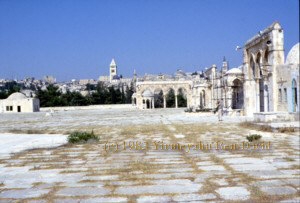 |
| Har ha-BaꞋyit, lined-up with Har ha-Zeit•imꞋ and ShaꞋ•ar ha-Rakham•imꞋ, looking west to The Foundation Rock. The "Dome of the Spirits" can be seen across the plaza (center of photograph). The mosque is to the south, to the left, entirely out of the photograph. Photograph © 1983 by Yirmᵊyahu Bën-Dawid. |
So, in the post-Beit ha-
In this, the implications of profaning of one's table (symbolizing the heavenly
Even among observant Jews and geir•imꞋ, on the feast days we are always in danger of forgetting that our feasting should be to replenish our energies to serve
 |
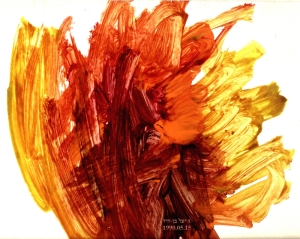 |
We learned in the pâ•râsh•âhꞋ concerning the A•qeid•
This theme is reinforced in éÄöÀçÈ÷ Âv•iꞋnu's re-opening of the wells of Av•râ•hâmꞋ, which had become "stopped up" – significantly, by non-Jews.
Wells, and water, in
That
éÄöÀçÈ÷ Âv•iꞋnu re-opened the wells of Av•râ•
It is sometimes asserted by the ignorant that no precedent can be found in Ta•na"khꞋ or Tal•mudꞋ supporting two roles of the Mâ•shiꞋakh. Not only is support conspicuous here, but just as conspicuous in the account of Yo•
Being condemned to death in the pit by his brothers parallels the A•qeid•
Again like
éÄöÀçÈ÷ Âv•iꞋnu, Yo•
éÄöÀçÈ÷ Âv•iꞋnu's first life – and redemptive death – parallels the life and redemptive death of the Mâ•shiꞋakh's first role—as Mâ•
As vice-regent of the world's superpower – Egypt, under Par•ohꞋ, over all of the civilized world, Yo•
Beyond these two conspicuous examples (and many other more subtle references), the very titles of Mâ•
 |
This pâ•râsh•âhꞋ begins åÀàÅìÌÆä úÌåÉìÀãÉú. As we explained last year, úÌåÉìÀãÉú is a plural fem. noun deriving from the verb éÈìÇã. Therefore, this noun could also be rendered offspring, descendants, generations, or éËçÂñÄéï — the "Tree of Life" / "Book of Life"; cf. Atonement In the Biblical 'New Covenant' Live-LinkT (ABNC)![]() .
.
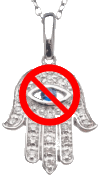 |
| Medieval Jewish superstition: Mesopotamian |
25.21— åÇéÌÆòÀúÌÇø
éÄöÀçÈ÷
ìÇ
With the destruction of the Beit ha-
On the surface, this might at first seem to conflict with RibꞋi Yᵊho•shuꞋa's overturning of the foreign currency exchange dealer's tables and the seats of those selling doves, based upon Yᵊsha•yâhꞋu 56.7 and Yi•rᵊmᵊyâhꞋu 7.11 (The Nᵊtzârim Reconstruction of Hebrew Matitᵊyâhu (NHM, in English)![]() 21:12-13). It was at these money changers' tables that the corrupt Hellenist-Tzᵊdoq•imꞋ Ko•han•eiꞋ hâ-RëshꞋa may have diverted the offerings to their own pockets, thus making them, indeed, thieves.
21:12-13). It was at these money changers' tables that the corrupt Hellenist-Tzᵊdoq•imꞋ Ko•han•eiꞋ hâ-RëshꞋa may have diverted the offerings to their own pockets, thus making them, indeed, thieves.
Their pretense was that many of the vows weren't valid and, therefore, there was no legal requirement to forward the offerings to the ![]() 23.18.
23.18.
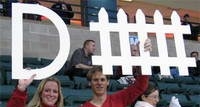 |
A system of substitutionary language was devised – as a rabbinic fence – to preclude uttering the Name profanely. The basis of the substitutionary language was ìÇ
 |
Consequently, yet another rabbinic fence was imposed, saying ÷ÈøÀáÌÈï was discouraged, lest one might forget and inadvertently attempt to say ìÇ
As a result of the imposition of multiplying rabbinic fences, disputes arose regarding what constituted a valid vow: "by the Mi•qᵊ
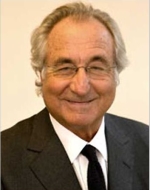 |
| Good frauds don't look like frauds |
Apparently, some who were unscrupulous would "vow" possessions in dispute rather than acknowledge their obligations, under the ruse of giving it to charity .Later, they would recant the "vow" on the grounds that it wasn't a binding vow ("I recited it wro-ong. Neener, neener, neener. It reverts to me now!"), sell the rejected ÷ÈøÀáÌÈï and pocket the money.
Combined with "tradition," over a generation, rabbinic fences become regarded as law, and laws then need further fencing-off. What is prohibited grows larger without end until there is rebellion and revolution. What is permitted grows smaller without end until there is rebellion and revolution. The inescapable direction is exactly the ridiculously fanatical lunacy (in direct contravention of Tor•
(Orthodox) Rabbi Harvey Falk suggested that corrupt Kohan•imꞋ may have used this as an excuse to divert ÷ÈøÀáÌÈðåÉú from goy•Jesus' time. According to the Mish•nâhꞋ (Ma•
"Most offerings from Gentiles were surely given for 'the Temple' or 'the Altar'—we should assume they were unfamiliar with the intricacies of these laws—and the Shammaite Pharisees' rulings on vows would have enabled the Hellenist-Tzᵊdoq•
Noting that the Pᵊrush•imꞋ agreed with RibꞋi Yᵊho•shuꞋa (
Rabbi Falk also suggests that it was the responsibility of the money changers at the Beit ha-
It was only thievery and corruption on the part of the foreign currency exchange dealers and Ko•han•eiꞋ hâ-RëshꞋa that RibꞋi Yᵊho•shuꞋa condemned. We find, however, that the accompanying of úÌÀôÄìÌÈä with a voluntary offering is ordained in Tor•
In Tei•mân•iꞋ Bat•eiꞋ-ha-KᵊnësꞋët, an auction is conducted both on ërëv Shab•âtꞋ for the volunteering of such pledge-offerings, to reserve
Since Jews don't handle money (checks, credit cards, etc.) on ùÑÇáÌÈú, winning "bids" amount only to pledges (not vows) to donate the amount during the ensuing week.
 |
26.5 åÀúåÉøÉúÈé – The plural number indicates [both Tor•âhꞋ shë-bi•khᵊtâvꞋ and the Tor•âhꞋ shë-bᵊ•alꞋ pëh] which includes those rules and interpretations transmitted to Mosh•ëhꞋ at Har Sin•aiꞋ (Rashi, Artscroll BeReishis, la.1083). Tor•âhꞋ shë-bᵊ•alꞋ pëh, is referred to specifically in Tor•âhꞋ shë-bi•khᵊtâvꞋ and Ta•na"khꞋ as mi•shᵊpâtꞋ, the Biblical counterpart of the Talmudic term: Ha•lâkh•âhꞋ.
27.40 – Speaking of Ei•sauꞋ, åÀàÆú àÈçÄéêÈ úÇòÂáÉã (and for your brother you shall work). Just as Yi•sᵊr•â•eilꞋ is an òÆáÆã
éÄöÀçÈ÷ Âv•iꞋnu's idea for a division of responsibility between Ei•sauꞋ and Ya•a•qovꞋ, which didn't work out, is likely the embryonic idea that developed into the establishment of the Lewiy•imꞋ and Kohan•imꞋ centuries later. As éÄöÀçÈ÷ Âv•iꞋnu remarked (27:23), "the voice is Ya•a•qovꞋ's voice, but the hands are Ei•sauꞋ's hands" (Artscroll BeReishis, la:1023). "The two —hands and voice, hard labor and sacred words —would seem to be gulfs apart, but they are not. éÄöÀçÈ÷ Âv•iꞋnu's intention was to forge a harmony between his sons that would place Ei•sauꞋ's world at the service of Ya•a•qovꞋ's world" (Artscroll BeReishis, Ia.1023).
Consider Tᵊhil•imꞋ 149.6. Ei•sauꞋ's world, as the outdoorsman trapper, was to provide venison sustaining
éÄöÀçÈ÷ Âv•iꞋnu and (
éÄöÀçÈ÷ Âv•iꞋnu hoped) Ya•a•qovꞋ and his descendants, to accomplish the work of
 |
ùÑÀìÈîÄéí is a cognate of ùÑÈìåÉí. These are offerings, portions of which are eaten by the Ko•heinꞋ and by the [donors] of the offering. The term æÆáÇç derives from æÈáÇç (slaughter according to the laws of ùÑÀçÄéèÈä; [halakhic laws governing slaughter and ÷ÈøÀáÌÈðåÉú]).
Adherence to ùÑÀçÄéèÈä is implicit in éÄöÀçÈ÷ Âv•iꞋnu's request for meat. The editors of Artscroll BeReishis ask rhetorically, Why should the [verb æÈáÇç] be used to refer particularly to [æÆáÇç] which are eaten? The answer lies in the similar nature of ùÑÀçÄéèÈä and the sort of eating which makes a Miz•beiꞋakh of even the ordinary table. Eating with the intention of preserving one's health in order to better serve Ël•oh•imꞋ removes a feast from the level of epicurean indulgence and elevates it into a holy offering—something too often overlooked (la:1014).
Solidly based in Scripture, Tal•mudꞋ teaches that the Kohan•imꞋ eat and the donors receive ki•purꞋ (la.1015). A Jew who enables a just Ko•heinꞋ to eat from his offering and replenish his energies supports, and thereby participates with, him in accomplishing the work of
Moreover, the law of ùÑÀçÄéèÈä elevates slaughter from a primal act of survival of the fittest to sanctification of the meat on our
Slaughter of animals by the goy•imꞋ merely to satisfy their lust for meat is not worship, but a kind of idolatry in the tradition of Ei•
Commenting on
éÄöÀçÈ÷ Âv•iꞋnu's request for Ei•sauꞋ to bring him venison for a feast before blessing him, the editors of Artscroll BeReishis (Ia. 1010) liken the Patriarchs to the îÆøÀëÌÈáÈä upon which the Shᵊkhin•âhꞋ rides. "The Shᵊkhin•âhꞋ rested upon them just as it rested upon [the vessels and implements] in the Beit ha-
The Mi•dᵊrâshꞋ comments that just as ùòèð"æ is forbidden, so, too,
This is the meaning of the prohibition of intermarriage memorialized in the seven crowned letters of the
By intermarrying, Ei•sauꞋ disqualified himself from the oath-blessing bᵊrit and, corroborated by his own actions, despised his heritage. "Therefore,
As Rav SaꞋad•yah Gâ•onꞋ opined, "Ei•sauꞋ was not bidden to do menial chores for his brother; this 'serving' was with dignity. Ei•sauꞋ was to act as Ya•a•qovꞋ's sword bearer in the sense of protecting him while leaving him free to attain the spiritual goals destined for him and his descendants." (Artscroll BeReishis, la.1157). éÄöÀçÈ÷ Âv•iꞋnu envisioned Ei•sauꞋ providing sustenance and protection with his sword in support of Ya•a•qovꞋ's responsibilities for study and worship.
 0250x333.jpg) |
This blessing-prophecy may relate directly to the Messianic Era in which, by Nᵊtzâr•imꞋ reckoning, we have been living since 1948 (establishment of the State of Israel) and which was announced in the heavens on Tisha bᵊ-Av, 1994.07.17, shortly after Israel signed the prophesied The 1993 Covenant Live-LinkT ![]() (of 7 years with the "antichrist" and broken in mid-term), when the Shoemaker-Levy 9 comets system, shaped like an angelic veiled-bride (symbol of Israel) with her bevy of veiled bridesmaids (symbols of a mixed multitude), merged with the planet called, in Hebrew, TzëdꞋëq—the planet that has symbolized the Mâ•shiꞋakh from antiquity.
(of 7 years with the "antichrist" and broken in mid-term), when the Shoemaker-Levy 9 comets system, shaped like an angelic veiled-bride (symbol of Israel) with her bevy of veiled bridesmaids (symbols of a mixed multitude), merged with the planet called, in Hebrew, TzëdꞋëq—the planet that has symbolized the Mâ•shiꞋakh from antiquity.
In bᵊ-Reish•itꞋ 22.13-17,
The phrase, "inherit the gate of your enemy ," has been assumed to mean conquering one's enemies. Today, however, a far more literal interpretation is likely. Israel's enemies today include, among other Arabs, descendants of Ei•sauꞋ. And what do we see happening in everyday's news? While we turn over Arab populated cities to Arab control, Israel essentially retains control of the gates of these cities!
Is the ceding of control over any of these villages supported in Scripture? éÄöÀçÈ÷ Âv•iꞋnu, the first to prefigure the Mâ•shiꞋakh, fittingly provides precedence for the Messianic Era (26.18-22). This classic "nomad vs city-dweller" confrontation parallels land disputes in the same lands today. By (desert) nomadic law, land is owned only as it is improved (by digging wells, planting trees, etc.). City dweller law recognizes deeds of bounded tracts of land. Disputes between the two approaches are inevitable.
 Tel Bᵊeir Sheva |
At the stage of Av•râ•hâmꞋ and éÄöÀçÈ÷ Âv•iꞋnu, the family included many armed servants. As they traveled from place to place, they constituted a wealthy tribe of desert nomads traveling with their own cavalry-army of camel-mounted armed herdsmen-soldiers. Commanding in excess of 300 armed herdsmen-soldiers, Av•râ•hâmꞋ and éÄöÀçÈ÷ Âv•iꞋnu were a force to be feared even by city-dwellers who could "hole-up" in a fortified village. Fortified villages, in those days, were often populated by tens or a few score—not hundreds or thousands —of men. It should not be surprising to find the local "kings" of small village-areas giving Av•râ•hâmꞋ and éÄöÀçÈ÷ Âv•iꞋnu great respect.
 Ancient well in Bᵊeir-Sheva (English: "Well Seven"). |
As a nomad, éÄöÀçÈ÷ Âv•iꞋnu led his herdsmen to a valley midway between Bᵊeir Sheva and Azah City (Jᵊrar, corrupted to Gerar; prob. today Teil Haror, 18km SE of Azah City), in which his father had dug wells years before. Under city law, the wells were abandoned when Av•râ•hâmꞋ departed them. The local Kᵊna•an•imꞋ filled in the wells to negate Av•râ•hâmꞋ's nomadic claim to ownership. Reasserting the family's right to ownership of the valley, éÄöÀçÈ÷ Âv•iꞋnu reopened his father's wells, calling them by the same name Av•râ•hâmꞋ had named them. When éÄöÀçÈ÷ Âv•iꞋnu dug additional new wells for the tribe, which had grown larger, a land dispute followed.
The first of these three wells, which caused a dispute, éÄöÀçÈ÷ Âv•iꞋnu fittingly named Bᵊeir òù÷ (Eiseq; foiled, exploited, taken advantage of). Consequently, éÄöÀçÈ÷ Âv•iꞋnu resigned his claim to Bᵊeir Eiseq and moved inland where he dug a second well.
The second well resulted in a second dispute, and éÄöÀçÈ÷ Âv•iꞋnu called the second well Bᵊeir ùèðä (Sitnah; adversity , from ùèï [Sâ•tânꞋ). As a result of this dispute, éÄöÀçÈ÷ Âv•iꞋnu resigned his claim to Bᵊeir Sitnah and withdrew again from Azah (then Philistia) inland.
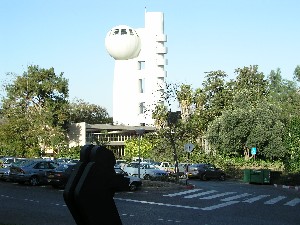 The Weizmann Institute, Rᵊkhovot. |
Finally, éÄöÀçÈ÷ Âv•iꞋnu moved inland and dug a third well which, free of dispute, he named Rᵊkhovot —in the vicinity of today's city of Rᵊkhovot. (The exact site of éÄöÀçÈ÷ Âv•iꞋnu's Bᵊeir Rᵊkhovot is unknown.)
If only éÄöÀçÈ÷ Âv•iꞋnu's borders were today's "red lines," this Messianic Patriarch would serve as our guide to resolve the land conflicts in the Messianic Era of today. Until éÄöÀçÈ÷ Âv•iꞋnu's borders become Israel's "red lines" there will be no peace.
One can perceive the Concurrent Village Networks—two interlaced yet mutually exclusive networks of villages in Yᵊhud•âhꞋ and the Sho•mᵊr•onꞋ (Samaria)—in the blessing-prophecy. Except for Peres-Beillin-Rabin & Co.'s foolish rush to capitulate beyond intelligent "red lines," one can almost perceive the Concurrent Village Networks, though distorted and misshapen by Rabin & Co., on the ground today. Under this model, Arab-populated villages, whose gates are controlled by the Israeli Tzah"l, would be formed into a network of non-contiguous Arab-controlled islands of Arab autonomous governments, while Jewish-populated villages in the remaining parts of Yᵊhud•âhꞋ and the Sho•mᵊr•onꞋ remain under Israeli control.
Moreover, to whom is Israel looking to enforce the policing of terrorism in these areas? Could this be the primary fulfillment of bᵊ-Reish•itꞋ 27.40? If so, our pre-intifada warnings to ensure fair and impartial justice to Arabs in Yᵊhud•âhꞋ and the Sho•mᵊr•onꞋ, which went unheeded, may have brought 27.40 back to haunt us: "and it shall be that when you descend you shall break off his [Ya•a•qovꞋ's] yoke from your neck."
Ovadyah ha-Nâ•viꞋ foresaw our situation (21): "And îåùòéí (moshi•yim; saviors) shall ascend Har Tziy•onꞋ to render mi•shᵊpâtꞋ, for the mount of Ei•sauꞋ, and the Realm shall be
As we have noted in other studies, the Islamic mosque sits south of the original site of the Beit ha-
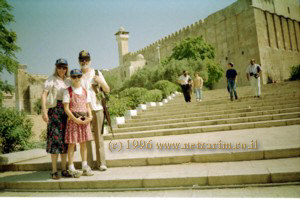 Karen, Yaeil & Paqid Yirmᵊyahu—in 1996-vintage police cap (since changed) with mandatory on-duty M-1—Khevron (corrupted to "Hebron") Makhpeilah (Multiple-Cave). Photograph 1996, Yirmeyahu Bën-David. |
The Three Patriarchs, the "tripod upon which Judaism eternally rests" (Artscroll BeReishis, 1a.1000), represent three major milestones of Judaic eras. Av•râ•hâmꞋ represents the initial "calling out" from among the peoples and the initial digging of the wells establishing claim to the land of Yi•sᵊr•â•eilꞋ.
éÄöÀçÈ÷ Âv•iꞋnu gives his life as a ÷ÈøÀáÌÈï on the Miz•beiꞋakh, and later redigs Av•râ•hâmꞋ's wells that had been stopped up by the Kᵊna•an•imꞋ – prefiguring perfectly the dual role of the Mâ•
These three Patriarchs thus mark the three major manifestations of
Av•râ•hâmꞋ embodies
Ya•a•qovꞋ, Yi•sᵊr•â•eilꞋ, embodies in his dream of the ladder, the kindred who would bridge the gap between the earthly-material and the heavenly realms; the bridge sought for centuries by the Par•ohꞋ's of Mi•tzᵊr•ayꞋim—but realized only by the Hebrew stepchild of Par•ohꞋ Tuth-Moses I: Moses (Mosh•ëhꞋ).
Then what does in-between éÄöÀçÈ÷ Âv•iꞋnu symbolize?
Rashi, on 26.2, comments upon
In other words, [having been consecrated as an offering to Ël•oh•imꞋ on the Miz•beiꞋakh at the A•qeid•âhꞋ],
éÄöÀçÈ÷ Âv•iꞋnu was compared to a perfect offering without blemish. Just as an offering becomes unfit if it passes beyond the enclosures of the Beit ha-
Tal•mudꞋ teaches (Ma•
"Rabbi Shmueil bar Nakhmeni said in the name of Rabbi Yo•khân•ânꞋ, In time to come, the Holy One, Blessed be He, will say to Av•râ•hâmꞋ, 'Your children have transgressed-úÌåÉøÈä.' [Av•râ•hâmꞋ] will say before Him, 'Master of the Universe, let them be wiped out in sanctification of Your Name.'
"Ël•oh•imꞋ will say, 'Let me tell this to Ya•a•qovꞋ who endured the suffering of raising children. Perhaps he will pray for mercy upon them. ''
"Ya•a•qovꞋ will say ''Let them be wiped out in sanctification of Your Name.'
"' éÄöÀçÈ÷ Âv•iꞋnu will say, 'Master of the Universe, are they my children and not Your children? When they said, "We will do" before they said, "We will hear" You called them "My firstborn" —now You call them my children and not Yours? ' If You endure all [the a•veir•otꞋ of úÌåÉøÈä], good. If not, let half be upon You and half be upon me. If You want them all to be upon me—I have already offered myself before You [at the A•qeid•âhꞋ]" In this, also, éÄöÀçÈ÷ Âv•iꞋnu is the paradigm for the Mâ•shiꞋakh.
"But when Yi•sᵊr•â•eilꞋ will come to express its gratitude, he will point, as it were, to Ël•oh•imꞋ and tell them to direct their praises to Him (ibid.)" (Artscroll BeReishis, I a:998-9).
In Yᵊsha•yâhꞋu 63.16
éÄöÀçÈ÷ Âv•iꞋnu is not mentioned with the other two Patriarchs.
éÄöÀçÈ÷ Âv•iꞋnu has a special role. Av•râ•hâmꞋ is depicted as no longer knowing the Jews, and Ya•a•qovꞋ as no longer recognizing them. But not so
éÄöÀçÈ÷ Âv•iꞋnu of the Miz•beiꞋakh A•qeid•âhꞋ, the Patriarch who first introduces the Father-Redeemer facet of
The rabbis don't grasp, indeed until
 |
| Billy goat |
éÄöÀçÈ÷ Âv•iꞋnu had requested öÇéÄã, not goats.
öÇéÄã is the
Perhaps it took more than one goat to provide the quantity of delicacies éÄöÀçÈ÷ Âv•iꞋnu was expecting from the öÇéÄã. Or perhaps more than one goat was needed to provide seamless, and undetectable, coverings for Ya•a•qovꞋ's arms and neck. But the Sages are unanimous that úÌåÉøÈä is never capricious. The very mystery surrounding the second goat is of utmost importance. This is the central event through which the A•qeid•âhꞋ ki•purꞋ of éÄöÀçÈ÷ Âv•iꞋnu flows to Ya•a•qovꞋ / Yi•sᵊr•â•eilꞋ the very empowerment that enables the three Patriarchs to be a blessing for us.
Where else do we find two goats, one shrouded in mystery, providing ki•purꞋ? Yom Ki•purꞋ, of course. There (wa-Yi•qᵊr•âꞋ 16.5, 22), the term for goat is ùÒÈòÄéø, a cognate of (Har) ùÅÒòÄéøý, a reference to "hairy" Ei•sauꞋ (e.g., bᵊ-Reish•itꞋ 32:4; 33:14-16; 36:8-9). Seen in this light, the mysterious term ìÇòÂæÈàæÅì (wa-Yi•qᵊr•âꞋ 16.8, 10, 20 [pop. "scapegoat"]) is easily deciphered: ìÀòÅæ àæ"ì (àæ"ì is an acronym for àÂáåÉúÅéðåÌ æÄëÀøåÉðÈí ìÄáÀøÈëÈä; i.e., our fathers or patriarchs, their memories [are] for a blessing).
The ùÅÒòÄéø ìÇòÂæÈàæÅì, instituted here by
NHM![]() 25.31ff asks, will our lives be judged as the first òÅæ of
25.31ff asks, will our lives be judged as the first òÅæ of
24.63—The Tal•mudꞋ (Ma•
In a note, the editors of Artscroll BeReishis include a comment of Kli Ya•qarꞋ: Although Av•râ•hâmꞋ and Ya•a•qovꞋ, respectively, instituted Sha•khar•itꞋ and Arᵊv•itꞋ, we find nowhere that Ël•oh•imꞋ responded to them immediately. That
éÄöÀçÈ÷ Âv•iꞋnu's request was granted without delay may, therefore, be taken as an indication that
As éÄöÀçÈ÷ Âv•iꞋnu is the prefigurement of the Mâ•shiꞋakh, the úÌÀôÄìåÉú of the Mâ•shiꞋakh would be answered immediately and
Being linked to
éÄöÀçÈ÷ Âv•iꞋnu, úÌÀôÄìåÉú
 |
23.27— And Ei•sauꞋ was a man knowing how to öÈã, a man of the field. öÇéÄã derives from the verb of the same spelling meaning to provide meat for the table. In Biblical usage, this term does not suggest sport hunting. The phrase "man of the field" equates roughly to "an outdoorsman." Ya•a•qovꞋ, by contrast, was a tent-dwelling àÄéùÑ úÌÈí
Like father, like son. 26:6,
éÄöÀçÈ÷ Âv•iꞋnu told the pᵊli•shᵊt•imꞋ (Philistines) that
In the case of Av•râ•hâmꞋ, Sarah was his half-sister, the daughter (20.12), as well as the daughter-in-law (11.31) of Av•râ•hâmꞋ's father, Terakh.
In the case of
éÄöÀçÈ÷ Âv•iꞋnu,
| Sheim | ||||
| | | ||||
| Nâ•khorꞋ | ||||
| — — | ————— — | —— —TërꞋakh——— | ————— | |
| | Av•râ• | | | | Nâ•khorꞋ | ||
| éÄöÀçÈ÷ Âv•iꞋnu | ————— | ———Bᵊtu•eil——— | ——— — | |
| | | | | | Lâ•vânꞋ |
||
| Ya•a•qovꞋ | Lei•âhꞋ & Râ•kheilꞋ |
We must conclude that, unlike his father,
éÄöÀçÈ÷ Âv•iꞋnu deliberately lied to the Pᵊli•shᵊt•imꞋ to preserve the safety of himself and ![]() 12.9-13). While khareid•imꞋ deny that this principle extends to health short of life-threatening situations, the principle is well-established in the wider community of Judaism.
12.9-13). While khareid•imꞋ deny that this principle extends to health short of life-threatening situations, the principle is well-established in the wider community of Judaism.
 |
Recall that "red" in Hebrew is àÈãÉí (àÈãåÉí). In 25.30 we read that Ei•sauꞋ asked
This is the birth of the àÁãåÉîÄéí. Whenever we read àÁãåÉîÄéí we should think Ei•sauꞋ and his grandson who personifies àÁãåÉîÄéí – A•mâ•
 |
In contrast to how úÌåÉøÈä commands each to regard His table outlined above, we find in 1.12-14 that, He curses (1.14) those who defile (1.12) His table with
This defiling of His table is described (1.12) as one example of çÄìÌåÌì
Many goy•imꞋ remain locked in a misunderstanding of çÄìÌåÌì
What these poorly informed goy•imꞋ (and the EJ editors) fail to realize as a result of shallow study and inability to read Hebrew is that:
Moreover, these poorly informed goy•imꞋ, who can't even read Hebrew, deliberately avoid the immediately following sentences in EJ: "But at least by the third century B.C.E. [emphasis added; ybd] the pronunciation of the Name [
Ta•na"khꞋ is explicit in prohibiting the pronounciation of the Tetragrammaton (four letter Name). Details and documentation may be found in my monograph: Profaning the Holy Name Unawares.
 |
Ma·lâkh·iꞋ, in 3.1, is well documented by the Sages as referring to the Mâ•shiꞋakh. Interestingly, Ma•lâkh•iꞋ ha-navi continues this same theme of dual roles for the Mâ•shiꞋakh, heralding two comings ("he will come" followed by "he comes") of Ma·lâkh·iꞋ in 3.1:
 |
The Haphtâr•âhꞋ section this week emphasizes the prohibitions against intermarriage. According to 2.11, whenever éÀäåÌãÈä (used as a fem. n.) åÌáÈòÇì áÌÇú-àÅì ðÅëÈø, thereby áÌÈâÀãÈä éÀäåÌãÈä, and committed a úÌåÉòÅáÈä. As well, çÄìÌÅì éÀäåÌãÈä ÷ÉãÆùÑ
Ma·lâkh·iꞋ ha-Nâ•viꞋ (2.12) leaves no doubt about the consequences of intermarriage. The man who does this éÇëÀøÅú
Is there no remedy for the one who has intermarried or the offspring? Through the Nᵊtzâr•imꞋ, yes. The environment in which a non-Jewish Christian spouse can see and understand that following RibꞋi Yᵊho•shuꞋa of Nâtzᵊr•atꞋ means observing halakhic Judaism is provided exclusively by the Nᵊtzâr•imꞋ. This opens the door for the non-Jewish spouse to reconcile with Tor•âhꞋ so that the couple can heal their relationship and dwell in the tents of Ya•a•qovꞋ. Offspring that are cut off from the tents of Ya•a•qovꞋ can be reconciled in the same way as the non-Jewish parent. For all these, there is a remedy through the Nᵊtzâr•imꞋ that is healing families and returning many who have strayed from the tents of Ya•a•qovꞋ.
Of course, the Haphtâr•âhꞋ also includes the prophetic passage of 3.1-4.
 |
2:7— For the lips of the Ko•heinꞋ éÄùÑÀîÀøåÌ-ãÇòÇú, and they shall request úÌåÉøÈä from his lips for he is a îÇìÀàÈêÀ
3.4— (Ash•kᵊnazꞋi reading goes only through 2.7), deals with the failure to ensure that one's offering is the choicest, a firstling, and not blemished.
There are four other closely related words, one non-related word and an abbreviation which should be reviewed to better understand the meaning of ãÇòÇú.
A more accurate word for the English term "knowledge" in Hebrew is éÆãÇò,
ãÌÅòÈä,
îÅéãÈò,
îÇãÌÈò.
A non-related word which might be confused is the f.n. ãÌÈú, from which is derived the adj. ãÌÈúÄé, which can be either the adjective "religious" or the possessive noun "my opinion / religion."
An acronym that sounds similar (but is not) is îã"à, for îÈâÅï ãÌÈåÄã àÈãÉí, the Israeli emergency ambulance and medical service.
 |
![]()
bᵊ-Reish•itꞋ 25.27 – åÀéÇòÂ÷Éá àÄéùÑ úÌÈí
•![]() 10.16, where see note 10.16.4).
10.16, where see note 10.16.4).
Anyone who doubts the presence of wolves—hypocritical slandering impugners—in the world need look no further than the talkbacks on ynet.com or, in the Christian world, the contra-Biblical and immoral stances of myriads of Christians and churches who countenance everything from homosexuality to infanticide.
But what does it mean to be úÌÈí? In Israel, the term is uncomplimentary, connoting naïveté and gullibility. That's because the wheeler-dealer con-man is admired while úÌÈí is an unfashionable embarrassment—except in the more pristine world of the Tei•mân•iꞋ Jews.
NHM![]() records a teaching of RibꞋi Yᵊho•shuꞋa concerning úÌÈí:
records a teaching of RibꞋi Yᵊho•shuꞋa concerning úÌÈí:
Then look(!), one approached and said, "Good RibꞋi, what good shall I do in order that I shall have life throughout the ages?" Yᵊho•shuꞋa said to him, "Why do you ask me about 'good?' One is good. If you wish to come into life, keep sho•meirꞋ-úÌåÉøÈä." "Which kind?" he said. Yᵊho•shuꞋa said (Shᵊm•otꞋ 20:12-16; Dᵊvâr•imꞋ 5:16-20): "You shall not murder; you shall not commit adultery; you shall not steal; you shall not perjure yourself; have kâ•vodꞋ for your father and mother; and you shall love your companion as yourself." The youth said to him, "I have kept all of these. What do I still lack?" Yᵊho•shuꞋa reported to him, "If you wish to be úÌÈí, go innocuously and sell your property. Give the proceeds to the humble and you will have treasure in the heavens. Then over here and follow me!" (NHM![]() 19.16-20)
19.16-20)
How was the wealthy young man falling short of úÌåÉøÈä? As â•
"When he heard that saying, the wealthy youth scratched his head and the saying displeased him. And â•donꞋ said to him, "How can you say, 'I have fulfilled úÌåÉøÈä and the nᵊviy•imꞋ'? For it stands written in úÌåÉøÈä (wa-Yi•qᵊr•âꞋ 19:18): 'Love your companion as yourself'; and look, many of your brothers, Bᵊnei (sons of) Av•râ•hâmꞋ, are dirty, grimy and starving to death, while your house is full of many good things. Yet, nothing at all comes out of your house to them. [The youth] went away distressed, for he had much property." (NHM![]() 19.22-24)
19.22-24)
úÌåÉøÈä expects us to prosper. One of the primary principles of úÌåÉøÈä is how to prosper with integrity, how to avoid being poor, working six days of the week in order that, on Shabat, you've been doing work from which to cease. How does this square with the teaching of RibꞋi Yᵊho•shuꞋa to "go innocuously and sell your property. Give the proceeds to the humble and you will have treasure in the heavens"?
The goal of poverty is strictly Christian, based on a Hellenization of this verse, NOT úÌåÉøÈä. In fact, poverty is a contradiction of what úÌåÉøÈä prescribes for every person. Each person should be so prosperous that he or she is able to help those who suffer a setback. úÌåÉøÈä assumes this prosperity for every person in requiring every person to give tzᵊdâq•âhꞋ, according to his or her means, to those in need.
 250x219.jpg) |
| Beggar Irwin Corey, NYC, lives in $3.5 mil house (former actor-comedian) |
Notice that RibꞋi Yᵊho•shuꞋa balances giving tzᵊdâq•âhꞋ with being shrewd. DON'T give tzᵊdâq•âhꞋ just because a beggar comes around and you feel embarrassed not to give. Some beggars—wolves—are simply con artists who make more money begging than you do working (and they're smart enough to look destitute and pitiful, not prosperous, while they're "on the job"). Giving to prosperous beggars just because they are persistent and make a convincingly pitiful presentation with a heart-rending story robs from those who are in genuine need, whom you SHOULD be helping. Be shrewd as well as úÌÈí. The best heart-rending stories come from the most practiced and professional con-artists. People in genuine need aren't that good at it. Always check the facts. Honest people have nothing to hide.
First, you should help those who follow úÌåÉøÈä, not those who reject úÌåÉøÈä.
The sure way to know you're helping a needy follower of úÌåÉøÈä is to either know him or her personally, check him or her out with the police, or give through a úÌåÉøÈä group that verifies the authenticity of both—that the person is a follower of úÌåÉøÈä and that his or her need is genuine—before dispensing tzᵊdâq•âhꞋ. Additionally, other úÌåÉøÈä considerations, such as helping the person help himself or herself and preserving his or her dignity in the process, should be ensured. You can only accomplish all of these things by giving through a proper úÌåÉøÈä organization.
Note: This is done by Beit-ha-KᵊnësꞋët Moreshet Avot—Yad Na•ami, the Tei•mân•iꞋ Beit ha-KᵊnësꞋët here in Ra•a•nanꞋâ(h), when you give tzᵊdâq•âhꞋ to their gamakh (benevolent fund, for genuinely needy Jews, primarily Teimân•imꞋ, here in Israel) through the Nᵊtzâr•imꞋ. (Make sure the amount is clearly earmarked for gamakh, to distinguish it from your support of the Nᵊtzâr•imꞋ.)
The bottom line is that you should prosper to the best of your ability within the constraints of integrity. But you cannot become wealthy if you are distributing the wealth to those around you who are in need. This is the point that RibꞋi Yᵊho•shuꞋa was making when he said:
"Amein! I tell you, hardly a wealthy person shall come into the Realm of the heavens. Again I say to you, that it is easier for a camel to come in through the night door of the ShaꞋ•ar than for a wealthy person to come into the Realm of Ël•oh•imꞋ." Having heard this, the ta•lᵊmid•imꞋ were exceedingly astonished saying, "So who will be able lᵊ-hashiv tᵊshuv•âhꞋ in order to be delivered? Looking at them, Yᵊho•shuꞋa said, "For persons this is an inability, but for Ël•oh•imꞋ all things are an ability." (NHM![]() 19.25-26)
19.25-26)
In other words, while it isn't in a person's self-interest, Ël•oh•imꞋ can instill a heart of flesh and compassion. That's an integral part of the úÌåÉøÈä definition of tzᵊdâq•âhꞋ.
Jews who are unfamiliar with our own úÌåÉøÈä deny this week's pâ•râsh•âhꞋ (25.19-33) when they deny the possibility of the unusual birth of RibꞋi Yᵊho•shuꞋa. The commentators to the Artscroll Stone Edition Ta•na"khꞋ acknowledge "The Sages note that the Matriarchs god to a mother who could not have given birth naturally."
What
Of course, the flip side of that coin is that if, based on that, one irrationally insists that a "miracle birth" implies divinity, then Sarah,
If one subscribes to logical / scientific explanations, as we do, then "unusual birth" is accurate while "miracle birth" can only be understood as synonymous with "unusual birth"; not supernatural, and no more "divine" than other births—all of which are by the Hand of the Creator.
The account in NHM![]() reads: "The birth of the Mâ•shiꞋakh was thus: His mother Miryam, who was hishtadkhah to Yo•seiphꞋ, before they had set up household together was found to be pregnant by the Spirit of Holiness' Yo•seiphꞋ had not known her until the time she gave birth to his firstborn son. He called him éäåùò. (See NHM
reads: "The birth of the Mâ•shiꞋakh was thus: His mother Miryam, who was hishtadkhah to Yo•seiphꞋ, before they had set up household together was found to be pregnant by the Spirit of Holiness' Yo•seiphꞋ had not known her until the time she gave birth to his firstborn son. He called him éäåùò. (See NHM![]() notes 1.18.3-7 & 1.25.1-3.)
notes 1.18.3-7 & 1.25.1-3.)
| úÌåÉøÈä | Translation | Mid•râshꞋ RibꞋi Yᵊho•shuꞋa: NHM |
NHM |
|||||||||||||||
|---|---|---|---|---|---|---|---|---|---|---|---|---|---|---|---|---|---|---|
| ||||||||||||||||||
 |
![]()
For all intents and purposes, a man will love his son only by chastening him. If he will prevent it, he eschews him and [the son] will become an infidel, like we find in eileh [toldot] Shemot Rabah (1.1).
The withholder of the ùÑÅáÆè eschews his son,and the one who loves his son îåÌñÈø him from the dawn of his life (Mi•shᵊl•eiꞋ Shᵊlom•oh′ 13.24).
Note: It was in its capacity of tribe-symbol that this context understands the ùÑÅáÆè—i.e. the exercise of authority, not the exercise of beating or, primarily, other punishment. What this passage teaches is that the father who ignores and neglects his child, exercising no guiding authority in his child's life, eschews the child and contributes to the child's demise. It is also in this context that one may better understand a play on words with bᵊ-Reish•itꞋ 49.10, perhaps for the first time: "ìÉà éÈñåÌø ùÑÅáÆè" (nor shall the ùÑÅáÆè deviate) from
Yᵊhud•âhꞋ until the Mâ•shiꞋakh (Shil•ohꞋ) comes'" This could also be translated as "The ùÑÅáÆè fromYᵊhud•âhꞋ shall not deviate until the Mâ•shiꞋakh comes'"Although îåÌñÈø derives from the verb éÈñÇø while éÈñåÌø derives from the root ñåø, nevertheless, the two seem to be related etymologically, in that one applies éÈñÇø to determine éÈñåÌø (
Pâ•qidꞋ Yi•rᵊmᵊyâhꞋu , 2001.11).
In conducting worldly affairs, a man who says to his companion, So-and-so waited for his son, he went down with him for his life. And what does Tal•mudꞋ say? "The withholder of the staff / scepter eschews his son'" is to teach that anyone who holds back [from admonishing] his son from his descending, his end is to become an infidel.
Thus we find with Yishmaeil, that he had a yearning for Av•râ•hâmꞋ, but [Av•râ•hâmꞋ] didn't subjugate him, and he became an infidel and eschewed Av•râ•hâmꞋ, going out of his house empty. What did Yishmaeil do? When he was 15 years old he began to bring an image from outside and played [with it], but there's no playing [with it], only
![]()
(Translated so far)
 |
 |